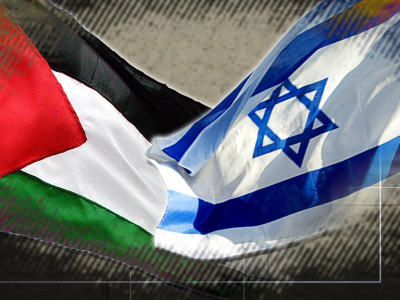The majority of Israelis and Palestinians support a two-state solution, a recent poll has found.
The poll, conducted jointly by the Hebrew University of Jerusalem and the Palestinian Center for Policy and Survey Research in Ramallah, found that 54% of Israelis and 46% of Palestinians support a permanent settlement package along the so-called Clinton parameters for a Palestinian-Israeli permanent settlement, as presented by then US President Bill Clinton at a meeting with Israeli and Palestinian officials on December 23, 2000.
These parameters involve the following issues:
(1) Final borders and territorial exchange; (2) Refugees; (3) Jerusalem; (4) A demilitarized Palestinian state; (5) Security arrangements; and (6) End of conflict.
Areas of greatest contention include the status of Jerusalem. Most of those polled from both Israelis and Palestinians disagreed with the solution proposed.
The issue of a demilitarized state of Palestine received the lowest support from those Palestinians polled — though the current level of support is the highest since 2003. A report by the two institutions responsible for the poll noted that, unlike the questions of refugees and Jerusalem, the issue of a demilitarized Palestinian state has not received due attention in public discourse, and may become a major stumbling block in efforts to reach a settlement.
DETAILED POLL FINDINGS
The full findings are downloadable here (as a PDF).
Final Borders and Territorial Exchange
The poll found that, 52% of Palestinians support or strongly support, while 48% oppose or strongly oppose an Israeli withdrawal from the West Bank and the Gaza Strip.
The withdrawal would involve land-swaps, with settlement areas comprising than 3% of the West Bank swapped for an equal amount of territory from Israel in accordance with a map presented to the Palestinian respondents.
The poll found that 44% of Israelis support and 48% oppose a Palestinian state in the entirety of Judea and Samaria (the West Bank) and the Gaza Strip except for several large blocks of settlements in 3% of the West Bank which will be annexed to Israel. Israel will evacuate all other settlements, and the Palestinians will receive in return territory of similar size along the Gaza Strip.
Refugees
46% of Palestinian respondents said they supported and 52% said they opposed a refugee settlement in which both sides agree that the solution will be based on UN resolutions 194 and 242.
The refugees would be given five choices for permanent residency. These are: the Palestinian state and the Israeli areas transferred to the Palestinian state in the territorial exchange mentioned above; no restrictions would be imposed on refugee return to these two areas. Residency in the other three areas (in host countries, third countries, and Israel) would be subject to the decision of these states. As a base for its decision Israel will consider the average number of refugees admitted to third countries like Australia, Canada, Europe, and others. All refugees would be entitled to compensation for their “refugeehood” and loss of property.
Among Israelis 39% support such an arrangement and 50% oppose it.
Jerusalem
32% of Palestinians polled said they support and 68% oppose a Jerusalem compromise in which East Jerusalem would become the capital of the Palestinian state with Arab neighborhoods coming under Palestinian sovereignty and Jewish neighborhoods coming under Israeli sovereignty.
Under this arrangement, Jerusalem’s Old City (including al Haram al Sharif) would come under Palestinian sovereignty with the exception of the Jewish Quarter and the Kotel, which would come under Israeli sovereignty.
Of those Israelis polled, 37% agree and 56% disagree to this same arrangement, in which Jerusalem’s Arab neighborhoods, including the Old City and Temple Mount would come under Palestinian sovereignty, while Jewish neighborhoods including the Jewish quarter of the Old City and the Kotel would come under Israeli sovereignty. In this framework, East Jerusalem will become the capital of the Palestinian state and West Jerusalem the capital of Israel.
Demilitarized Palestinian State
Of the Palestinians polled 28% support and 71% oppose the establishment of an independent Palestinian state that would have no army, but would have a strong security force and a multinational force deployed to ensure its security and safety.
Under this framework, Israel and Palestine would be committed to end all forms of violence directed against each other.
Among Israelis 60% support and 33% oppose this arrangement.
(5) Security Arrangements
52% of Palestinians support and 48% oppose a compromise whereby the Palestinian state would have sovereignty over its land, water, and airspace, but Israel would have the right to use the Palestinian airspace for training purposes, and would maintain two early warning stations in the West Bank for 15 years.
A multinational force would remain in the Palestinian state and in its border crossings for an indefinite period of time. The task of the multinational force would be to monitor the implementation of the agreement, and to monitor territorial borders and coast of the Palestinian state including the presence at its international crossings.
52% of Israelis support and 39% oppose this arrangement.
End of Conflict
63% of Palestinians support and 36% oppose a compromise on ending the conflict so that when the permanent status agreement is fully implemented, it would mean the end of the conflict and no further claims will be made by either side. The parties will recognize Palestine and Israel as the homelands of their respective peoples.
Among Israelis 66% support and 28% oppose this component.
The Whole Package
Among Palestinians 46% support and 53% oppose the whole package combining the elements as one permanent status settlement.
Among Israelis 54% support and 37% oppose all the above features together taken as one combined package.
Other findings: negotiation tracks
47% of Israelis support and 48% oppose the dismantling of most of the settlements in the West Bank as part of a peace agreement with the Palestinians.

